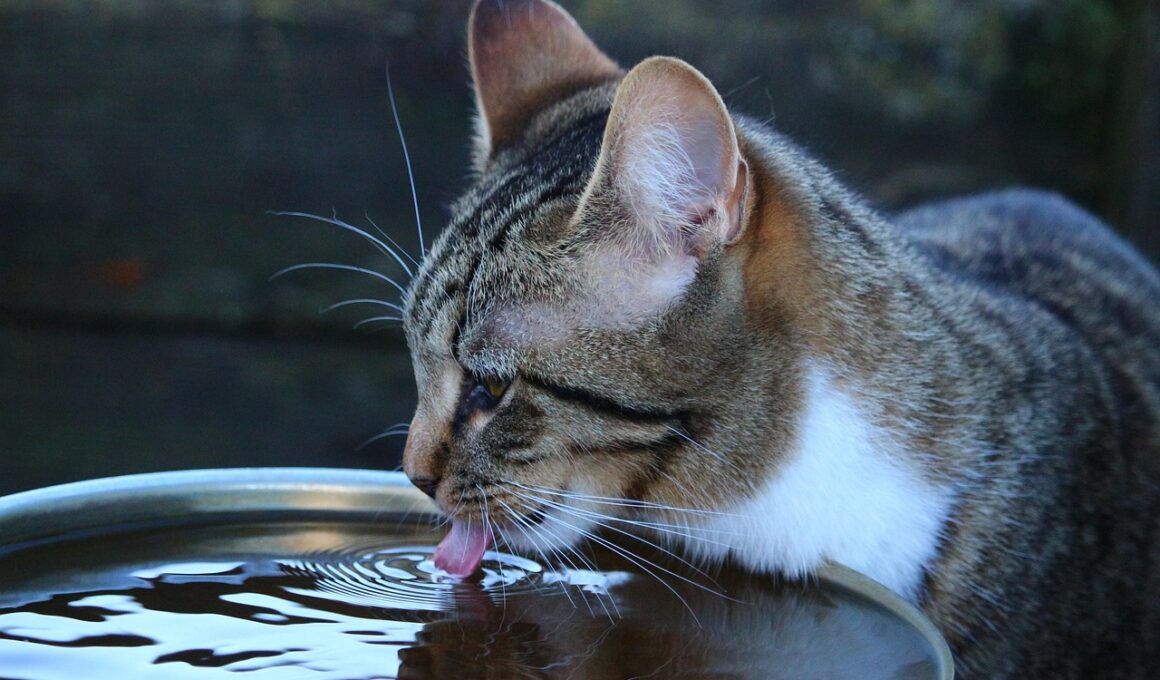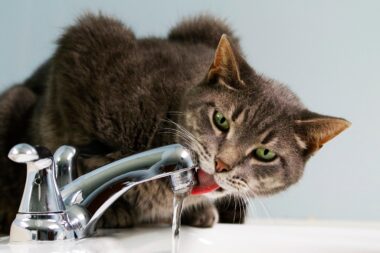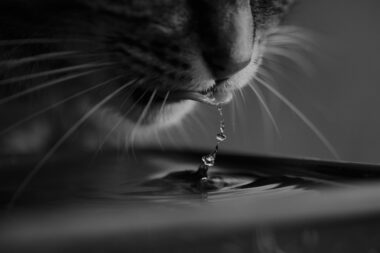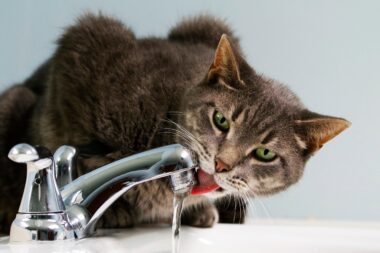Water Intake and Kidney Health in Cats
Cats are unique creatures when it comes to drinking habits, often leading to concerns about their hydration, particularly in relation to kidney health. Dehydration can lead to serious medical issues, including kidney disease. Cats are naturally desert animals, so their bodies have developed mechanisms to conserve water. Consequently, many cats do not drink sufficient water daily, which can affect their overall health. It’s crucial for cat owners to monitor their pet’s water intake closely. A general recommendation is for cats to drink at least 0.5 to 1 ounce of water per pound of body weight each day. However, many cats fall short, relying on dry food for inadequate moisture. To encourage drinking, consider providing fresh water daily and using water fountains, which some cats find appealing. Additionally, incorporating wet food into their diet can increase their overall fluid consumption. Ensure that your cat has access to clean, fresh water at all times. This simple practice fosters good hydration and supports kidney function, helping to maintain optimal health and longevity in your feline friends.
Monitoring your cat’s water intake is essential for maintaining their health. Some signs of inadequate hydration include lethargy, decreased appetite, and dry gums. Moreover, increased thirst or urination might indicate underlying health issues, such as dehydration or kidney problems. Regular veterinary check-ups are crucial to ensure your cat’s kidneys are functioning properly and to catch any possible concerns early. Understanding your cat’s behavior around water can provide insights into their needs and preferences. Some cats may prefer drinking from running water, while others might enjoy a bowl in a specific location or with a particular depth. You can also observe if your cat drinks more during warmer months or after physical activity. It’s vital to encourage consistent drinking habits, given that even mild dehydration can lead to increased concentration of waste products in the urine. This may contribute to urinary tract issues over time. Creating a favorable drinking environment can make a significant difference. Experiment with different bowls, locations, and water types. Hydration is an important consideration, influencing your cat’s kidney health.
Hydration Solutions for Cats
Improving your cat’s hydration can involve dietary adjustments alongside providing fresh water. Some pet owners have found success in transitioning cats to wet food, which contains a significantly higher moisture content than dry kibble. Many holistic veterinary diets have added moisture levels specifically targeting kidney health. Not only does wet food help with hydration, but it also appeals to cats’ natural instincts, enhancing their enjoyment of mealtimes. You could also try adding water or low-sodium broth to dry food or highly palatable foods, further increasing their fluid intake. Cats sometimes find water more appealing when it’s flavored. Offering ice cubes in their water bowl may also pique their interest; the novelty can encourage them to engage with their water source more. Additionally, scent-based attractions with herbs like catnip can sometimes entice cats to drink more. Use varying bowls made of ceramic or glass, avoiding plastic, as some cats dislike the smell of plastic. By understanding your cat’s individual preferences and experimenting with different hydration techniques, you can play a vital role in keeping them well-hydrated and healthy.
It’s essential to note the impact of age and health conditions on water intake. Older cats often require more hydration due to a decrease in kidney function and may benefit from a reassessment of their diet. The dietary needs of aging cats may differ drastically from those of younger cats. If your cat has been diagnosed with chronic kidney disease (CKD), dietary management becomes paramount. Consulting with a veterinarian for specialized diets specifically designed to support kidney health could bring significant benefits. These diets typically contain enhanced moisture content, reduced protein, and lower phosphorous levels. Moreover, keeping a close watch on your senior cat’s drinking habits is critical in managing their health. Also, routine laboratory tests help monitor kidney function and hydration levels. Consider integrating certain supplements recommended by your veterinarian to support kidney function. Staying proactive about hydration is essential for any cat but becomes increasingly important as they age. By paying attention to dietary needs and adjusting hydration strategies alongside professional guidance, you can help sustain your cat’s hydration and overall well-being.
The Role of Water in Cat Health
Water plays a crucial role in several body functions of cats, including digestion, circulation, and temperature regulation. Hydration impacts overall energy levels and organ function, specifically the kidneys. When kidneys do not receive enough water, they cannot filter waste effectively, leading to potential health issues. Cats rely heavily on their kidneys to process nutrients and eliminate toxic waste. Therefore, it is crucial to ensure that they have adequate hydration for optimal kidney function. Dehydration can lead to kidney stone formation and urinary tract infections, both of which might require expensive medical interventions. Flushing toxins out of the body through urine is vital; low water intake can concentrate minerals and substances that crystallize into stones. When a cat is well-hydrated, urine becomes diluted, making it less likely to form troublesome crystals. Furthermore, adequate hydration can ease the stress on a cat’s kidneys, enabling them to function better over time. Therefore, prioritizing your cat’s hydration can significantly contribute to maintaining their long-term health and preventing chronic kidney diseases.
For cat owners, being proactive is essential when it comes to hydration and kidney health. Observing your cat’s behavior surrounding their water intake can provide significant insights. If your cat is showing signs of decreased water consumption, it’s crucial to investigate potential causes. Stress, environmental changes, and illness can all affect a cat’s desire to drink. Creating a conducive and calm atmosphere for your cat to drink can encourage proper hydration. Furthermore, be mindful of your cat’s overall health—report any abrupt changes in drinking habits to your veterinarian. They may recommend specific tests to check kidney function or other related concerns. Transitioning to a more hydration-focused diet or introducing additional wet foods are actionable steps to address hydration issues. Remember that cats are prone to certain urinary health issues as a result of dehydration, making it critical to advocate for their health through proper hydration. Adopting a proactive and mindful approach can contribute to your cat’s vitality. Pay attention to their hydration habits, as doing so plays a crucial role in their overall well-being.
Conclusion: Hydration Matters
In conclusion, recognizing the importance of hydration for your cat cannot be overstated. Adequate water intake is essential for maintaining optimal kidney health and preventing serious diseases. Keeping track of your cat’s drinking habits and employing various methods to enhance their water consumption can significantly impact their overall well-being. From wet food diets to proper hydration techniques, being proactive is key in supporting your cat’s health. Regular veterinary consultations play a vital role in ensuring that any developing health issues are promptly addressed. As a cat owner, it’s essential to educate yourself about the signs of dehydration and the implications it may have on your cat’s health. Improving their hydration doesn’t just contribute to their kidney function; it enhances their energy, digestion, and overall vitality. Experiment with different drinking sources and encourage habits that promote fresh water intake. Keep your cat’s health a priority, focusing on their hydration needs. Making these adjustments and being vigilant in observing their behaviors can lead to a healthier and happier feline companion for years to come.
Provide fresh water every day and keep a close eye on your cat’s drinking habits. Whether through novelty or dietary adjustments, managing hydration is crucial for kidney health. Further emphasize hydration by introducing wet foods, adjusting the bowl type, and perhaps allowing for flavored water. Paving the way for optimal water intake is essential for any cat. In doing so, we can ensure that they lead long, healthy lives, free from the hindrances of dehydration and kidney-related issues. Regular check-ups with the vet can also aid in maintaining optimal health for your furry friend. Participating in awareness efforts regarding hydration challenges may help others adjust their practices for their beloved pets. Monitoring their water habits and implementing hydration strategies creates a supportive environment for your cat to thrive. As multifaceted as cat behavior can be in relation to water, making a consistent effort fosters opportunities for improvement in their kidney health. Encourage play and engagement at their water bowl, because every drop matters. Hydration remains a foundational aspect of feline health, deserving the attention and care it deserves.





